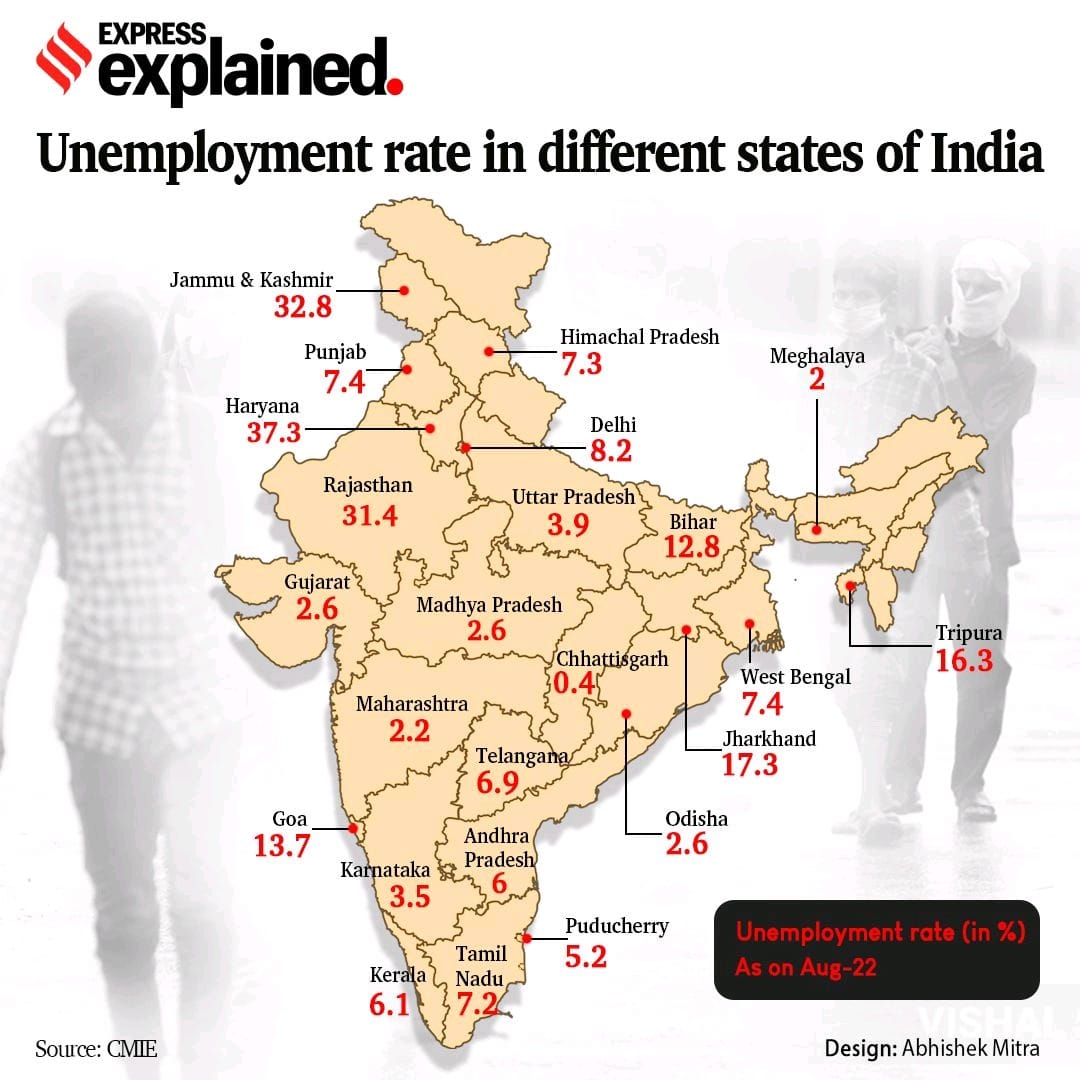This a continuation of the Labour Notes South Asia (LNSA) dispatches | We also hope to build a partial archive of posts from the original LNSA mailing list (2000 to 2019) (see list URL) | See archived posts 2004-2005 | [the full webarchive of the list is now unavailable as it has been permanently removed by yahoo on Dec 2019]
Wednesday, September 14, 2022
Thursday, September 8, 2022
India - AICCTU Appeal: Support Relief Work to Daily Wage Workers Due to Torrential Rains in Bangalore
AICCTU Appeal: Support Relief Work to Daily Wage Workers Due to Torrential Rains in Bangalore
Bengaluru has been experiencing torrential rains for the past few weeks, thus rendering several thousand working-class families in the lurch due to submergence of their houses. Mahadevapura zone in Bengaluru have been inundated in rain water owing to encroachment of lakes and rajakaluves (storm water drains) by illegal construction sites, lack of urban planning and apartments pumping out water from their premises into these nearby working-class areas. Neither the BBMP, nor the state government authorities have paid any heed to the dire circumstances of these slum residents.
The workers living in these areas are predominantly engaged in solid waste management, including powrakarmikas, auto drivers/helpers, rag pickers, construction workers, domestic workers, daily-wagers, among others, who make substantial contribution in building the city. Workers in these areas have lost their homes and most of their belongings. They do not have dry shelter and no food to eat. The children are among the worst off since they have lost their books and are unable to go to school.
Several complaints have been filed by the affiliate unions of All India Central Council of Trade Unions (AICCTU) with the BBMP and state government authorities in regard to the situation in these areas and to ensure temporary shelter arrangements, provision of free ration, bedsheets, clothing, among other facilities, along with compensation for all the loss sustained due to submergence of all their household items, including electronic items, two-wheelers, ration, utensils, clothes, etc. While the government will take steps whenever it does, there is an urgent need to ensure that the people have access to basic amenities like shelter and food. AICCTU proposes to distribute tarpaulin to each family who are facing torrential rains every evening when the downpour starts. We also intend to provide ration kits for 2 weeks which would include: 10 kgs rice, 4 kgs wheat flour, 5 kgs rice, 1 litre oil, 1 kg salt, 2 kgs sugar and spices (haldi, chilli powder, jeera powder and coriander powder). We also intend to provide each family an education kit, which includes 4 notes books, 2 pens, 2 pencils, 2 erasers, 2 sharpeners and 2 boxes of crayons. With this we hope that the children will be able to go to school and the box of crayons to keep them engaged and distracted atleast for some time from the tragedy unfolding around them.
We are writing to you with an appeal to support this endeavour to help those who have lost everything to the floods. While media is busy talking about the housing complexes which are flooded and employees of big companies being stranded and the loss that the ORR companies have had during these rains, the survival of those who have a massive role in building the city is now at stake. You could use any of the payment options below:
Bank Name: Syndicate Bank (now merged with Canara Bank)
Bank Branch: Vimanapura, Bengaluru
A/c Holder Name: AICCTU (All India Central Council of Trade Unions)
A/c no.: 04112010104497
IFSC no.: SYNB0000411
MICR no.: 560025043
UPI: whynotpips@okaxis
Phone number: 9448135832
For more information, contact: Lekha (9686757053) or Swathi (9481168048)
[Please send a screenshot of the transaction to any of these numbers]
Sunday, September 4, 2022
Workplace accidents: Inside India's 'factories of death' | Archana Shukla (BBC NEws)
Workplace accidents: Inside India's 'factories of death'
By Archana Shukla
BBC Business Correspondent
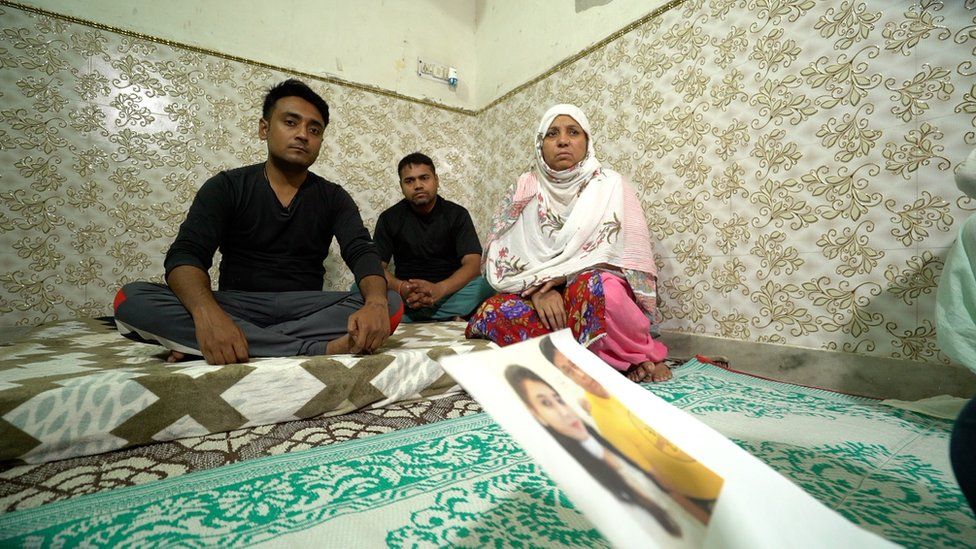
"This is a factory of deaths."
Ismail Khan's hand trembles as he points towards the second floor of a burnt building in India's capital, Delhi.
That was where he last saw his younger sister - trapped and suffocating, desperate to find a way out as the building was consumed by smoke and fire.
Muskan, 21, was among 27 people killed in the massive fire, which broke out in May at an electronics manufacturing unit in the four-storey building.
In the days after the fire, a top police official told media that the building's owner had not obtained clearance certificates from the fire department and police before subletting three floors of the building to two brothers who ran the manufacturing unit. The Delhi police's public relations officer also told the BBC that the unit did not have the "requisite licences" for operation.
The BBC phoned the factory owners several times but did not receive an answer. The BBC also tried to contact their lawyer but he refused to share his details where we could send queries.
India is aiming to become an industrial powerhouse, with government schemes and reforms tailored to encourage investments and innovation. But tragedies like the Delhi fire are all too common, with desperate and vulnerable workers often paying the price.
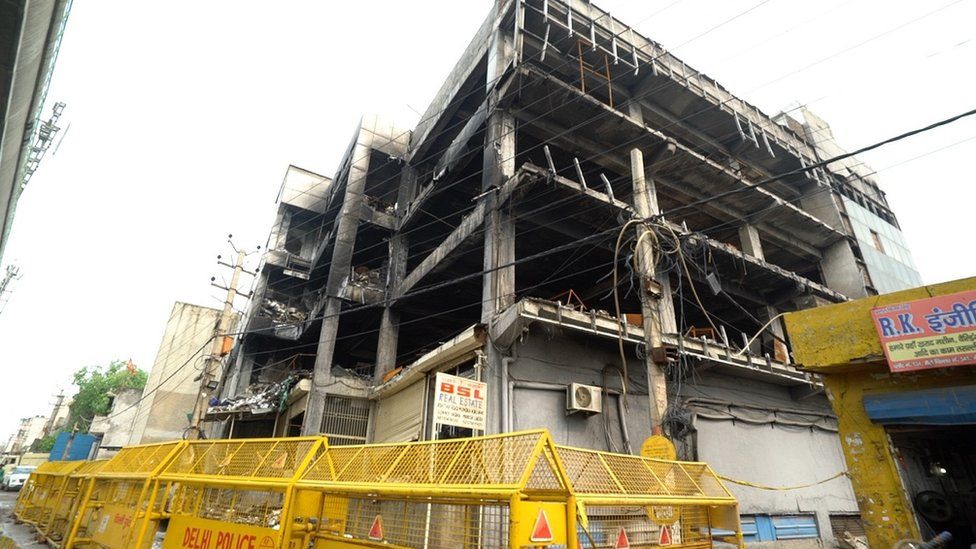
Industrial accidents kill hundreds of people and permanently disable thousands every year. A federal minister told parliament in 2021 that at least 6,500 workers had died while working in factories, ports, mines and construction sites in five years. Labour activists, who have worked in the field for years, told the BBC that the figures could be higher as many incidents are not reported or recorded.
According to data collected by global workers' union IndustriAll, sectors such as manufacturing, chemicals and construction report the most fatalities in India. In 2021 alone, it said an average of seven accidents were reported every month in Indian manufacturing industries, killing more than 162 workers.
Over the years, news reports have flagged that workers in "small, unregistered factories" are often most affected by industrial accidents. The victims are usually poor workers or migrants whose families don't have the resources to fight legal battles.
The BBC has emailed questions to the labour commissioner at the Delhi Municipal Corporation and officials at the federal labour ministry, but has not received responses yet.
'I want justice'
Rakesh Kumar often wakes up screaming in the middle of the night. He lost three of his daughters in the fire at the Delhi factory, where they assembled Wi-Fi routers for 8,000 rupees ($100; £84) a month each.
"My daughters must have suffered so much," he says.
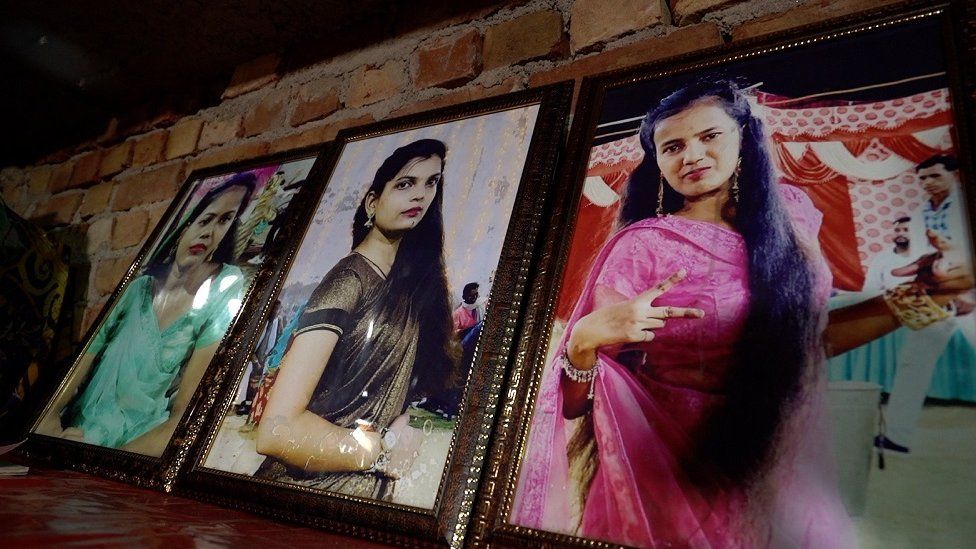
The family waited for news about them for days after the fire, until the police called them for a DNA test to identify their charred remains. His daughters were eventually cremated a month after the fire.
"I want justice for them," says Mr Kumar.
In August, the Delhi police filed charges in court against five accused in the case. They include attempt to commit culpable homicide and causing death by negligence.
Rajesh Kashyap, a trade union activist in Delhi, alleges that many factories in the capital and its suburbs flout at least one industrial or safety law, but action is rarely taken.
He and other labour activists allege that in many industrial accidents, cases languish for years while the accused are released on bail.
According to the Delhi police, 663 factory accidents were registered just in the capital over the past five years, in which 245 people died. Around 84 people were arrested in connection with these accidents.
In response to allegations from labour activists that the initial investigation in these kinds of cases is often flawed, police say they try to ensure "immediate action against the culprits". But, they add, convictions may not occur in many cases due to a number of reasons, including delay in getting forensic results and opinions from technical experts, among others.
Struggle for compensation
The BBC met several families who are still grappling with the loss of their loved ones, many of whom were the only breadwinners.
But legal red tape and a mix of factors can make it hard to access compensation from the companies.
A senior lawyer, who has worked on several worker compensation cases, told the BBC that such legal proceedings usually ran on for years.
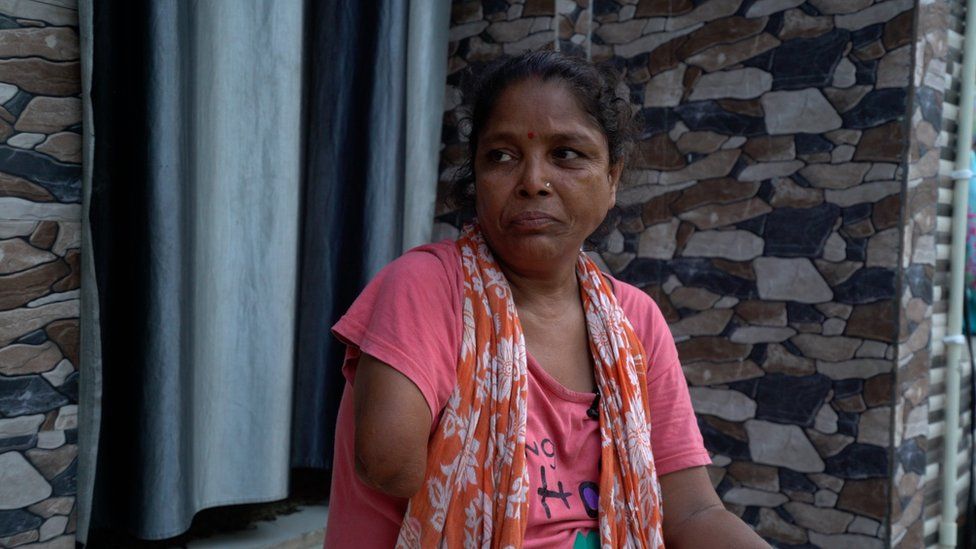
Often, the government itself announces a lump-sum payment to the families, shifting focus away from demanding compensation from companies.
And by the time a case is taken up, the families of the migrant workers - hurt and broken by their loss - may have moved back to their village or another city in search of jobs.
"Workers don't have much faith in the legal system due to the long, complex processes. So, they take whatever money they get as settlement or ex-gratia from the government and leave," says Chandan Kumar, who is part of a civil society organisation that assists informal workers.
The BBC tried to contact families of the victims of a 2018 factory fire in Delhi in which 17 workers died, but almost all of them had left the city.
The case is similar for those maimed by these accidents.
Sangeeta Roy, 50, lost an arm while using a cardboard-cutting machine at her company three years ago. She says she didn't receive any compensation from her employers and had to wait for three years to get a government pension for injured workers.
There is no official national data on workers left disabled by industrial accidents. But a recent survey by non-profit Safe in India Foundation - done mainly in the vehicle parts manufacturing factories in northern India - says 3,955 serious accidents took place between 2016 and 2022. Seventy-percent of the injured had lost their fingers or crushed their hands while using a metal pressing machine.
India is a major auto manufacturing hub in South Asia, employing an estimated 10 million workers. A large part of the manufacturing is contracted and subcontracted to smaller companies.
The non-profit's founder, Sandeep Sachdeva, told the BBC that many states don't accurately report such cases.
Worries for the future
India has begun reforming its labour laws through four new labour codes that include provisions for occupational safety, health and working conditions.
But activists are concerned that the new laws might set the compliance bar even lower.
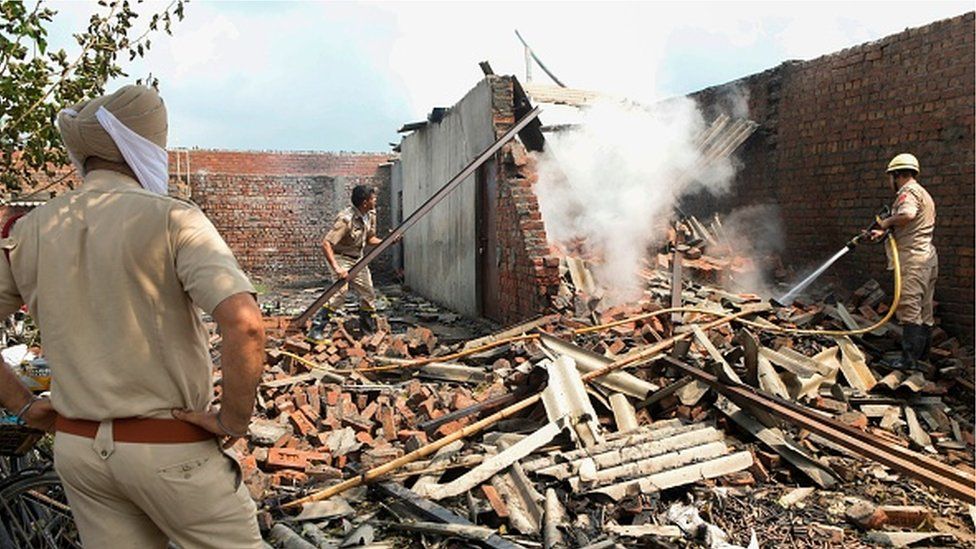 Image source, Getty Images
Image source, Getty ImagesWhile the earlier law said that any company with 10 workers or more should have a safety committee, the proposed new law raises the number to 250.
But according to the 2016 Economic Census, just 1.66% of total non-agricultural establishments, 2% in manufacturing and 1.25% in the construction industry employed 10 or more workers.
There is no data available for the informal economy, which employs 90% of India's workforce.
Many companies are also shifting to hiring contract workers over permanent ones which further weakens workers' rights, says lawyer and labour rights activist Sudha Bhardwaj.
Desperation for jobs has also made workers hesitant to join unions.
The government has also changed protocols for workplace inspections in an effort to make the process easier for companies. While currently, labour officers are responsible for inspecting and ensuring the implementation of safety rules, their role will change to that of mediators under the new codes.
Labour experts say this makes it even less likely for factory owners to prioritise workers' safety or social security.
"Workers' safety will eventually be nobody's responsibility," says Sidheshwar Prasad Shukla, an academic and labour activist.

Friday, September 2, 2022
India should embrace ILO’s historic declaration on workplace safety | K R Shyam Sundar, Aug 28 2022
India should embrace ILO’s historic declaration on workplace safety | K R Shyam Sundar, Aug 28 2022
Read more at: https://www.deccanherald.com/opinion/panorama/india-should-embrace-ilo-s-historic-declaration-on-workplace-safety-1140201.html
Incidents such as the gas leakage in chemical and other factories in Andhra Pradesh’s Vizag in May 2020 and Anakapalli district on August 2, 2022, ferroalloy plant in Vizag in September 2021, and the fire accident in unregistered manufacturing electronics units in Mundka, New Delhi, have often occurred.
Given the regular occurrence of industrial accidents, workplace safety in India, despite the so-called “strict and rigid” labour regulations, has become a matter of grave concern. It is in this context we need to understand the adoption of “a safe and healthy working environment” as part of the fundamental and core labour rights by the International Labour Organisation (ILO) in June 2022.
The ILO in 1998 adopted the historic declaration: Fundamental Principles of Rights and Work (FPRW). The FPRW recognised four principles of labour standards: freedom of association and the effective recognition of the right to collective bargaining; the elimination of all forms of forced or compulsory labour; the effective abolition of child labour; and the elimination of discrimination in respect of employment and occupation. For each of them, two ILO conventions were identified as core conventions.
It was expected that the member countries by virtue of their membership of ILO and their commitment to its Constitution, it is their obligation, irrespective of their ratification record of the said ILO conventions, to “respect, to promote and to realise, in good faith” the above-mentioned four sets of principles.
Following the FPRW, ILO and the core conventions enjoyed global legitimacy. India has ratified only six of the eight core conventions. It has not ratified C.87
and C.98 (freedom of association and the right to collective bargaining) for political reasons.
Even a casual perusal and analysis of the FPRW, one can see that the right to work-life safety, minimum wages, social security and others are among the core principles. Differences in economic growth between countries were a possible reason to refrain from adding them. However, the cruel reality of ever-rising workplace accidents globally cannot be disregarded for long.
[ . . .]
Read more at: https://www.deccanherald.com/opinion/panorama/india-should-embrace-ilo-s-historic-declaration-on-workplace-safety-1140201.html
